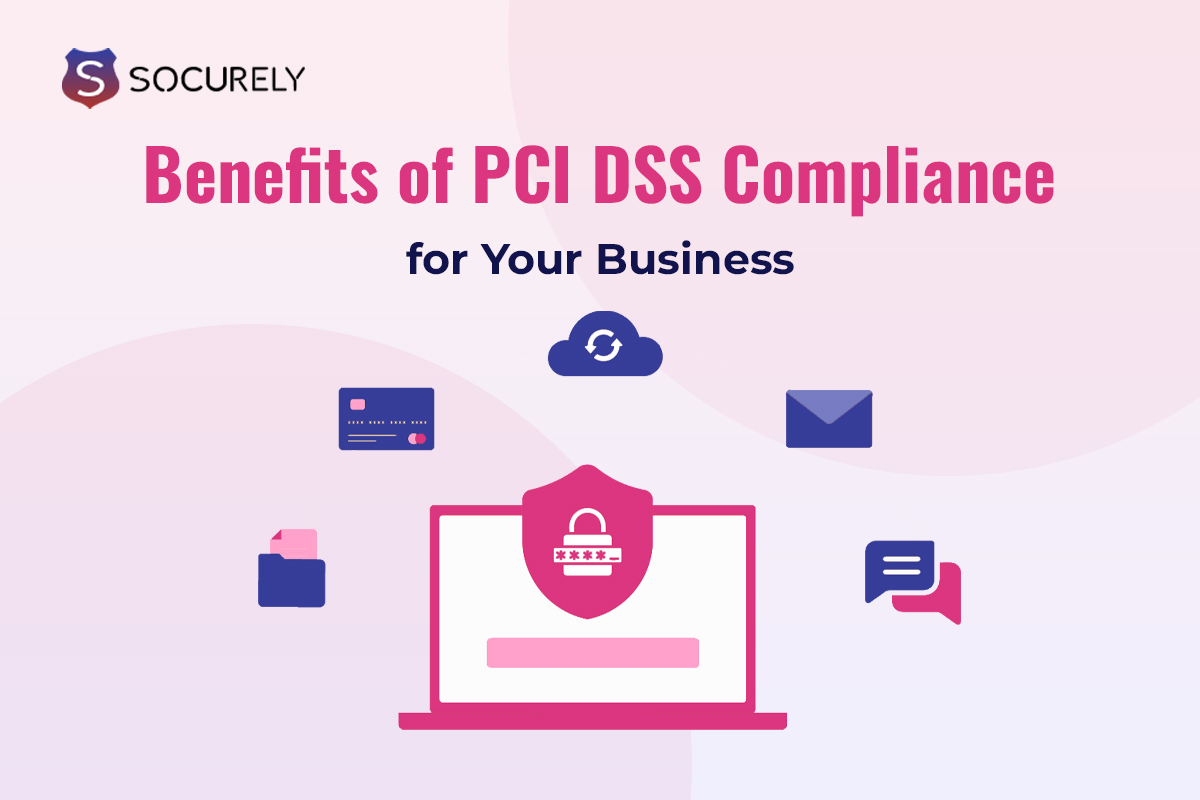A data breach is a must and common scenario in the modern technological world. Also, with this insecurity, not all businesses feel safe and sound. It is where the PCI DSS Compliance comes into play!
Do you know that 90% of businesses refuse to work with companies prone to cyber threats? Also, as per research from the National Cyber Security Alliance, 60% of small businesses face cyber threats every 6 months.
PCI DSS compliance is a set of security standards designed to ensure that all companies that process, store, or transmit credit card information maintain a secure environment. So, if your business accepts credit or debit cards as a form of payment, PCI DSS Framework becomes your solution.
So, let’s elaborately discuss the benefits of PCI DSS Compliance.
What Is PCI DSS Compliance?
Nearly 30% of data breaches impacted small firms, and 70% of those intrusions targeted credit card information, according to the 2023 Data Breach Investigations Report. A vital framework created to safeguard cardholder data and ensure safe payment transactions is the Payment Card Industry Data Security Standard or PCI DSS.
The Payment Card Industry Data Security Standard (PCI DSS) is a set of security standards created to protect card information during and after a financial transaction. Developed by the Payment Card Industry Security Standards Council (PCI SSC), it provides a framework for a comprehensive security program, including requirements for security management, policies, procedures, network architecture, software design, and other critical protective measures.
PCI DSS Levels & Requirements
PCI DSS compliance is divided into different levels based on the number of credit card transactions a business processes annually:
- Level 1: Over 6 million transactions annually.
- Level 2: 1 million to 6 million transactions annually.
- Level 3: 20,000 to 1 million e-commerce transactions annually.
- Level 4: Less than 20,000 e-commerce transactions in 1 year up to 1 million total transactions.
Each level has its own set of requirements, from completing an annual Report on Compliance (ROC) by a Qualified Security Assessor (QSA) to conducting quarterly network scans by an Approved Scanning Vendor (ASV) and submitting an annual Attestation of Compliance (AOC).
Top Benefits Of PCI DSS Compliance
Enhanced Security
The primary advantage of PCI DSS compliance is enhanced security. By adhering to these standards, your business can significantly reduce the risk of data breaches and protect sensitive customer information. This not only safeguards your customers but also protects your business from the financial and reputational damage associated with data breaches.
Customer Trust
Any business needs to build and maintain customer trust. PCI DSS compliance demonstrates your commitment to data security, reassuring customers that their information is safe with you. This can enhance your reputation and customer loyalty, ultimately driving more sales.
Avoiding Penalties
Non-compliance with PCI DSS can result in hefty fines and penalties from credit card companies. These fines can be crippling for businesses, especially small ones. Ensuring PCI DSS compliance helps you avoid these financial repercussions and focus on growing your business.
Competitive Advantage
In a market where customers are increasingly concerned about data security, being PCI DSS compliant can give you a competitive edge. It can differentiate your business from competitors who may not prioritize data security, making your services more appealing to security-conscious customers.
Improved IT Infrastructure
Achieving PCI DSS compliance requires you to evaluate and enhance your IT infrastructure. This not only helps you meet the compliance requirements but also improves your overall IT security. A robust IT infrastructure can lead to more efficient operations and reduce the risk of downtime and technical issues.
Benefits of PCI DSS Compliance for Small Businesses
Cost Savings
While achieving PCI DSS compliance may involve some upfront costs, it can save small businesses significant amounts in the long run. By preventing data breaches and avoiding fines, you can protect your financial health. Additionally, many customers are willing to pay a premium for businesses they trust, potentially increasing your revenue.
Simplified Compliance Process
For small businesses, navigating the compliance landscape can be daunting. However, PCI DSS provides a clear framework and guidelines, making it easier to achieve compliance. By following these standards, you can streamline your compliance efforts and focus on your core business activities.
Access to New Markets
Being PCI DSS compliant can open doors to new business opportunities and partnerships. Many larger companies and payment processors require their partners to be PCI DSS compliant. By meeting these standards, you can expand your market reach and attract new business opportunities.
Get Started With Socurely
As the leading provider of PCI DSS compliance solutions, Socurely offers a comprehensive framework to help your business achieve and maintain PCI DSS compliance effortlessly. Our proven approach ensures that your organization meets all requirements while safeguarding cardholder data. Here’s how Socurely can help you navigate the complexities of PCI DSS compliance:
Risk Assessment
Our experts conduct a thorough risk assessment to identify potential security vulnerabilities within your organization. This step is crucial for understanding the specific risks your business faces and developing a tailored strategy to mitigate them.
Policy Development
Creating robust information security policies is essential for maintaining compliance. Socurely helps you develop and implement policies that address all aspects of PCI DSS requirements, ensuring that your business practices are aligned with industry standards.
Employee Training
Educating your employees about PCI DSS compliance is vital for ensuring that security measures are properly implemented. Socurely provides comprehensive training programs to equip your team with the knowledge and skills needed to uphold data security practices.
Internal Audits
Regular internal audits are key to maintaining compliance and identifying areas for improvement. Socurely conducts these audits to ensure that your security measures are effective and up-to-date, helping you stay ahead of potential threats.
Continuous Improvement
Compliance is an ongoing process. Socurely offers continuous support to help your business adapt to evolving security standards and enhance your compliance efforts. We work with you to implement improvements and maintain a strong security posture.
Conclusion
PCI DSS compliance is more than just a regulatory requirement; it’s a crucial step in protecting your business and your customers. By achieving compliance, you can enhance your security, build customer trust, avoid penalties, gain a competitive advantage, and improve your IT infrastructure. For small businesses, these benefits are particularly impactful, offering cost savings, simplified compliance processes, and access to new markets. Partnering with Socurely ensures you have the expertise and support needed to achieve and maintain PCI DSS compliance, giving you peace of mind and protecting your customers’ data.
FAQ
What are the penalties for non-compliance with PCI DSS?
Non-compliance with PCI DSS can result in hefty fines from credit card companies, increased transaction fees, and potential loss of the ability to process credit card payments. It can also lead to reputational damage and loss of customer trust.
How often do I need to conduct network scans for PCI DSS Compliance?
Businesses are required to conduct quarterly network scans by an Approved Scanning Vendor (ASV) to maintain PCI DSS Compliance. These scans help identify vulnerabilities and ensure that your security measures are effective and up-to-date.
Can my business be classified as Level 1 without processing 6 million transactions?
Yes, a business can be classified as Level 1 if it meets specific criteria set by card brands, such as being the target of a data breach that exposed cardholder information. Acquiring banks or other requesting parties may also classify a business as Level 1 based on these criteria.







